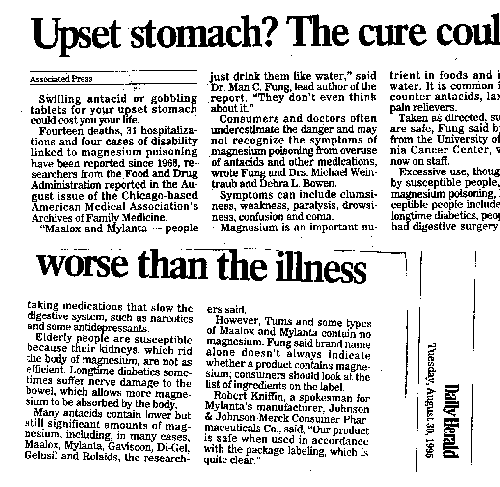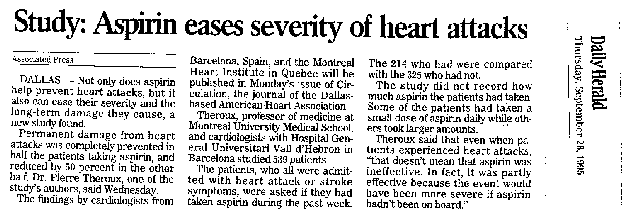

It would be news, by the way, if magnesium were really toxic. How and why did this story make all the network and local television news casts and newspapers on August 29-30, 1995?
As far back as 1972 the late Dr. Roger J. Williams reported in his book Nutrition Against Disease that a 1957 study showed magnesium to be beneficial to the heart:
"The possibility that magnesium deficiency may also be implicated in coronary heart disease arose when it was reported that injections of magnesium sulfate brought about "dramatic clinical improvement" in patients who had suffered from angina pectoris and coronary thrombosis, and that the lipoprotein levels were brought to normal in many cases."[Bersohn & Oelofse, Lancet: 1:1020, 1957]
Today, Dr. Brian Leibovitz, PhD, reports in a recent issue of the Journal of Optimum Nutrition that MAGNESIUM
"is now recognized as a first-line medicine for the treatment of heart attacks. A study published in The Lancet, for example, reported the effects of a double-blind, randomized, placebo-controlled study in 2,316 patients with suspected myocardial infarction. The dose of magnesium was high (about 8.7 grams given intravenously over a 24 hour period), but the results were remarkable: magnesium reduced cardiovascular mortality by 25 percent. The author's conclusion: " "Intravenous magnesium sulfate is a simple, safe, and widely applicable treatment. Its efficacy in reducing early mortality of myocardial infarction is comparable to, but independent of, that of thrombolytic or antiplatelet therapy."These findings have been confirmed and reconfirmed in many clinics and laboratories. Teo and colleagues, for example, in an analysis of seven clinical studies, concluded that magnesium (in doses of 5-10 grams by intravenous injection) reduced the odds of death by an astounding 55%."
"Studies of magnesium have revealed it to be Nature's 'calcium-channel blocker' ; unlike its drug counterparts, however, magnesium has no toxic side-effects. Another important effect of supplemental magnesium is its ability to mitigate the cardiotoxic effects of catecholamines. Prielipp and associates, for example, published results of a clinical trial in which magnesium (10 mg per kg body weight per hour, or approximately 700 mg per hour for an average adult) attenuated the cardiotoxic effects of epinephrine in 17 bypass patients. Interestingly, the drug captopril - an angiotensin- converting enzyme (ACE) inhibitor - has been demonstrated to work by raising intracellular...."
In summary, inexpensive magnesium is now, some 38 years after the Lancet report, widely recognized as a crucial life saver, if and when used in the fight against heart disease. All unbiased studies have shown it to be non-toxic, even in very large (gm) amounts.
So what it going on here? Why "smear" magnesium? Even more interesting, why would all the mass media be willing to print the smear? (This question is important in light of the apparent unwillingness of the media to report on Dr. Rath and Dr. Pauling's lipoprotein(a) discovery.. A discovery that would affect the health of more than one half million people every year in the U.S. alone!)
Well, magnesium is not only a direct competitor for a wide array of expensive cardiac medications; seems to work better, but it directly challenges medical establishment assertions that "simple nutrients" are ineffective in and of themselves therapeutically.
It is bad enough that a story like "the magnesium scare" could make ABC, CBS, NBC, CNN, and the papers in the United States based on a single questionable study; one among hundreds that are published each month, but why pick up a story that even the authors admit contain numbers of incidents affecting less than 2 people per year? (By the way, some experts we asked about this offered their opinion that it is much more likely the large amount of aluminum consumed-- not the magnesium -- was the root cause of the reported problems.) A more balanced report would have mentioned the great therapeutic value that is now attributed to magnesium.

In your mind, substitute "vitamin B6" for "aspirin". Now, what would you think of a study that divided "potential or actual" heart attack victims into 2 groups based on whether or not they had taken vitamin B6?
Maybe this study is the best "they can do"? Although hard to document, we have been told that all the aspirin studies that "prove" an aspirin a day keeps a heart attack away -- were with buffered aspirin, i.e., with added magnesium. Our sources point out that it is unlikely that further studies using "plain" aspirin will be undertaken because preliminary studies always show "plain" aspirin does not show the same protective affect against heart attacks. So if you still believe what you read in the mass media, make sure your daily aspirin is buffered! (Or much better yet, take a magnesium tablet instead!)
Why is the press so willing to print slanted stories like this? And why are they so unwilling to pick up other factual stories that would be of great interest to the public. (After all, journalists get heart disease too.) Perhaps there is some obscure legal reason why it is so easy for oranized medicine to dupe the media. If the FDA/AMA hold a press conference and proclaim some new "fact" -- maybe the media czars feel they are less likely to be sued and don't fear their reputation can be harmed?
It is up to you, my dear reader, to help change this. Do not be afraid to challenge your local and the national editors when they print these stories. Here's a tip. When you see an article like this, ask yourself: "What drug benefits?" On the surface, it almost looks as if the magnesium scare article is "drug bashing". It is not hard to spot the vested interest behind these stories. You can make a difference!